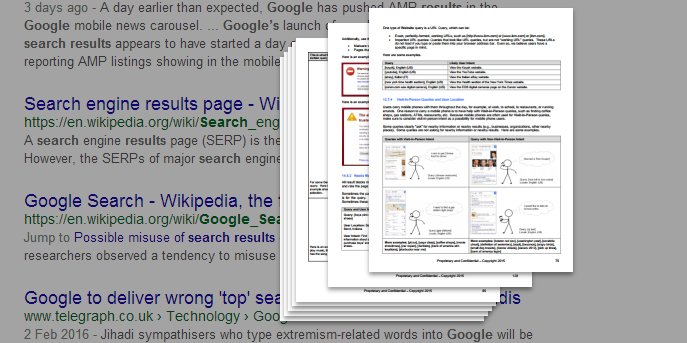
Google has just released a major revision of the guidelines that it's website evaluators use to rate the quality of sites returned in tests of search results - guidelines that "reflect what Google thinks search users want". It can be assumed that should evaluators find significant numbers of websites near the top of search results that are poorly rated using these guidelines then Google would analyze their algorithms and make appropriate changes.
Google's 160-page quality guidelines differentiate websites into three broad categories: Spam websites, Low-Quality websites and High Quality websites. Since Google's aim is to deliver results that are useful to their users, only websites classified as High Quality will be ranked highly in search results. Websites that can be classified as Spam will usually be eliminated from search results entirely over time. It is therefore vitally important to your business that Google considers your website to be a High Quality one.
Google's Definition of a "Spam" Website
According to Google's guidelines, a Spam website is one that is created to deliberately deceive or harm users, with any of the following properties:
- Designed to deceptively extract important private information (such as credit card information) from users
- Mimics the appearance of other well-known websites
- Claims to independently compare products or services, but exists solely to make money through affiliate links
- Falsely claims to be the personal website of a celebrity
- Misleads users into clicking on adverts, monetized links or suspicious downloads
- Redirects the user to a different website without their permission
- Effectively has no content, or content that is meaningless or that requires no effort to create
Google's Definition of a "Low Quality" Website
A Low Quality website is not as bad as a Spam website, but it still won't result in high search engine rankings, no matter how much time and effort is invested in search-engine optimization. A Low Quality website can be defined as one that is not deliberately trying to deceive or harm users, but does not provide a useful or enjoyable user experience, and may have any of the following properties:
- Mostly contains content that requires little time, effort, skill or expertise to create.
- Does not contain enough content for the purpose of the page.
- Contains content that needs to come from an authoritative source (such as medical or legal advice) but does not
- Contains content that comes from an authoritative source (such as medical or legal advice) but is outdated
- Contains content that needs to come from an experienced source (such as cleaning or cooking tips) but does not
- Has a negative reputation on review websites
- Contains unhelpful or unrelated supplementary content
- Is designed poorly or is difficult to read
- Has too many broken links, missing images or other signs of lack of care and maintenance
- Is not updated as regularly as deemed necessary. For example, news websites should be updated daily, but personal websites can be updated less frequently
Google's Definition of a "High Quality" Website
A High Quality website contains elements that should be obvious to most website owners, but others that are less obvious. According to Google, a High Quality website has most of the following properties:
- Contains a "satisfying amount of high quality main content" that takes a significant amount of time, effort, expertise or skill to create and matches the topic and purpose of the page
- If selling products allows users to find and purchase them easily
- Has no technical errors and is cared for and maintained
- Is updated as frequently as judged appropriate
- Has a positive reputation. Website evaluators check ratings websites, Wikipedia articles, blog posts and forum discussions to judge the reputation of a company
- Has a level of expertise or authority that is appropriate to the subject matter
- Is well organized and has a functional layout, with it being clear what the main content is
- Makes it clear what parts of pages are adverts, either by labeling or through page design
- Has clear background and contact information, and if necessary, details about who is responsible for the website
- Has good supplementary content, for example ways to help shoppers find similar products
Does Your Website Pass the Test?
Once your website is built and is being well received by your users and customers it is easy to sit back and feel satisfied. But if your website is not meeting all of the criteria for a High Quality website, the chances are you are losing out on new visitors (and customers) from search engines. We recommend taking some time to evaluate each of the points above, preferably with an objective third party, and really consider how your website, and it's authority and reputation, can be improved.


